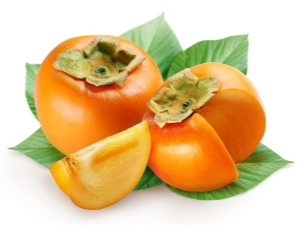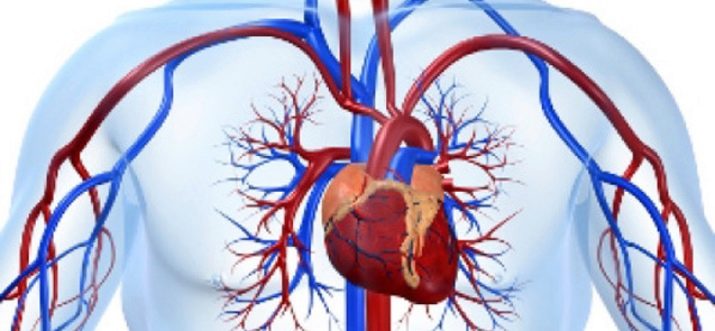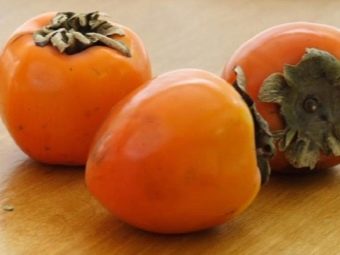How many calories in persimmon and how is it useful?

Fruits are traditionally considered a useful product, but each variety for one person can only be a tasty vitamin supplement to the diet, and for the other it is literally necessary because of its properties. At the same time, one should not forget that excessive consumption of any fruit can lead to certain negative consequences. For this reason, it is worthwhile to study more carefully what a persimmon is - a bright orange fruit from the tropics, familiar to everyone from childhood.
Chemical composition
Many modern consumers perceive fruits as a source of a huge amount of vitamins and useful microelements, and persimmon, of course, is no exception to the rule. When considering its composition, the most impressive is the huge amount of vitamins A and C contained here, the first of which contributes to the preservation and even improvement of eyesight, and the second is known to all as an excellent means to strengthen the immune system.
The manganese present in the composition strengthens the mucous membranes and prevents cancer. Abundant fiber content contributes to the rapid saturation of the product with a relatively low calorie, so that a person looks slim and fit. Copper, phosphorus and vitamin B help to improve overall body metabolism.
Persimmon diet can also be of great importance due to the fact that it contains numerous antioxidants that help the body resist aging processes:
- catechins are known as a natural antibiotic aimed at combating inflammation and preserving the integrity of blood vessels;
- betulinic acid and lycopene prevent the development of cancer, and the latter also has a beneficial effect on the state of the heart;
- lutein avoids the occurrence of cataracts;
- Zeaxanthin has a complex meaning for maintaining visual function in the normal state.
The high content of potassium in persimmon helps to maintain the work of all the muscles of the body at the proper level. In addition, the fruit in question is also high in iodine, which helps prevent problems with the thyroid gland.
The nutritional value
Persimmon is used in various forms, but it is quite logical that, like most other fruits, it is consumed mostly fresh. Nevertheless, there are exceptions when the product can be found in a dried form. As an ingredient, it can be found even in some compotes and jams, and if we consider the use of persimmon not only in the context of food, but in general, women often use it as a cosmetic.
If we talk about the composition of the fruit in the context of BJU, then the fiber and other vegetable fibers are absolutely dominant. Of the "main" components here are the most carbohydrates, but their share is relatively small 15.2%. The proteins and fats in this product are approximately equal, but even together they do not gain 1%.
Calorie content
For those who want to lose weight, the calories contained in each product consumed are also very important. Persimmon, like many fruits, is considered a dietary product, but here you need to understand that everything depends on the form in which the fruit is consumed.
Contrary to the fact that persimmon is a sweet fruit, its caloric content is relatively low and amounts to about 55-65 kcal per 100 grams. More precisely, it is impossible to indicate caloric content, since everything here depends on the specific variety, however, even with a possible maximum of calories, the product remains dietary, if only it is the main dessert.
As for each individual berry, the weight of 1 piece averages 150-200 grams, and therefore the caloric content is within about 130 kcal, whereas in some cases it can be quite modest 75 kcal.
We rarely see such a product, but in their homeland persimmon is also used to make a curious dried fruit that tastes very much like dates. It should be understood that in the process of drying only water leaves the fruit, but all the nutrients, as well as calories, remain in a concentrated form. Because of this, the caloric content of dried persimmon is very impressive 270 kcal per 100 grams, and therefore such treat is usually contraindicated for diabetics. Women who follow the figure, it is possible to use this product, but perhaps with strict planning of their own diet.
As a kind of processing, persimmon is often frozen. This is not done so for long-term storage, as to eliminate the characteristic binder taste, which disappears under the influence of rapid freezing.
However, the frost does not affect the caloric content, so it remains at the same level - about 60 kcal per 100 grams on average.
Due to the velvetiness of the pulp of a ripe persimmon fruit, they often make incredibly tasty jams, however, it must be remembered that it differs in its content of a huge amount of calories. Here, of course, it all depends on the grade of the used persimmon and on the amount of added sugar, however, the caloric content of the jam is usually estimated at no less than 300 kcal. It is obvious that such a product is contraindicated for diabetics and people with overweight, and well-attended women of the slender figure have to decide for themselves whether they are ready for such a risk.
Canned persimmon, not in the form of jam, is relatively rare and can be produced by radically opposite methods, both by rapid freezing in sugar syrup and by digestion without much sugar. Dessert does not particularly absorb sugar, because fruit without syrup contains about 85 kcal per 100 grams. Another thing is that, along with syrup, calorie content can increase so much that it becomes comparable to jam.
Persimmon can not only eat but drink. In supermarkets you can hardly find persimmon juice, but you can squeeze it at home - it is both delicious and healthy as much as the original product. But the caloric content of such a decision will surely please those who are afraid of excess weight - it is only 48 kcal.
Properties
All substances contained in a persimmon that are beneficial to the body must be consumed in a certain amount. An overdose of any of them can lead to unexpected and not very pleasant consequences, because, as you know, there is medicine in the spoon and poison in the cup.
Therefore, for a better understanding of how much persimmon should be used by each specific person, it is necessary to determine the potential benefit and harm.
Benefit
Each person would prioritize the usefulness of persimmon in its own way, but most modern fans of this fruit appreciate it as an excellent product that promotes weight loss. The fact is that persimmon refers to products that require more energy to digest than they bring to the body - high fiber content simply does not allow the stomach to quickly cope with such a task. It turns out that the stomach is not empty, and the calories have not arrived especially. In this case, persimmon also cleans the intestines from toxins.
With its low calorie content, persimmon contains a fairly high percentage of sugars that will help in another aspect of the fight against obesity. It is enough to eat a small such fruit before training, and an abundance of useful energy for dropping pounds is provided.
A significant content of antioxidants allows us to talk about persimmon as a product that effectively fights aging. This, however, is not about external signs, but rather about the general condition of the body, but this is also a very useful feature. The components that make up the berries protect the DNA from damage, thereby minimizing the likelihood of cancer. In addition, it is proved that the fruit effectively prevents numerous old eye diseases.
A high content of vitamin C helps to improve immunity, which is crucial in the cold season. However, not everyone knows that this does not end the beneficial properties of such a vitamin, for example, it participates in the production of collagen, which prevents the appearance of wrinkles.
Moreover, the health of a trace element such as iron is very useful for health, but without sufficient vitamin C, the body is unable to absorb it normally.Iron is a key building material for bones and muscles, as well as the circulatory system.
Potassium, contained in persimmon, is an excellent means of suppressing muscle pain - it helps to relax them and restore them more quickly. However, then the fruit is worth appreciating not even for it, but for its ability to normalize excessively high pressure, because the effect of muscle relaxation is most clearly manifested in the expansion of blood vessels.
Women appreciate persimmon not only as food, but also as a cosmetic. The effect of rejuvenation is much more pronounced, if not only to eat the fruit, but also to use it as an ingredient for various face masks. The result is a noticeable lifting effect, as well as an expanding arsenal of tools to combat acne.
Persimmon is recommended for pregnant women as a valuable source of many vitamins and microelements. Considering that another, completely new organism is being built inside of my mother's, all these useful components will not be superfluous.
Not only for women, but for men persimmon is very useful. Experts say that its composition helps the body fight a potential prostate adenoma. In addition, due to improved blood flow, the potency is significantly increased.
In this case, persimmon has a beneficial effect even in the field of bad habits. For example, it contributes to the quickest possible decomposition and removal of alcohol from the human body, thanks to which it is even professionally recommended to people suffering from alcoholism. If brute force is a single character, the berry will help to quickly overcome the hangover.
As for smoking, the persimmon, oddly enough, has a relatively similar tonic effect on the human body and improves mood, so it can be used as a distracting tool for those who decide to quit.
Harm
Any product could theoretically be harmful if used improperly. At the same time, persimmon is a fruit so specific that it is not difficult to make a mistake in the characteristics of its intake.
First you need to understand that this useful product is not for everyone. It does not look quite logical, however, pregnant women can eat this fruit, but nursing - risky. Although this berry is a very valuable source of vitamins and minerals, it can also provoke an allergic reaction in a child.
It is practically contraindicated to give children a persimmon. Unlike most other fruits, persimmon has an astringent effect, and in a children's body, where the digestive system is not yet established, this can cause serious problems. For this reason, it is not until three years old that the fruit is introduced into the diet, and then in small pieces, gradually increasing the dose, if everything is normal. However, some experts advise even with this wait up to ten years.
For the same reason, persimmon should be very carefully consumed by those who already suffer from constipation and intestinal obstruction, as well as some other problems of the digestive tract.
In the postoperative period, the berry can cause seam divergence due to its astringent effect.
When the liver is sick, persimmon cannot be eaten. The fact is that the diseases of this organ lead to an increased content of potassium and phosphorus in the body, and it is precisely these microelements that are very rich in berries. If diseases of the urinary system are observed, the persimmon is also dangerous, because it is diuretic and is guaranteed to increase the frequency of urination.
It cannot be said that persimmon is directly contraindicated for diabetics, but its glycemic index is very close to dangerous. This means that the use of even a single persimmon berry can lead to an aggravation of the patient's condition.
Tips on drinking
It is desirable to use a persimmon not as a dessert, but separately from any other products - as an independent meal. Otherwise, the slowly digestible fruit can form phytobezozoar - stones that remain forever in the digestive tract. The risk of this pathology is especially high in people with various diseases of the gastrointestinal tract.
Unripe berries contain tannin - a substance that provokes a knitting effect - even more than ripe ones. Accordingly, the risk of developing pathologies only increases from such a delicacy.
In some cases, ripe persimmon has a laxative effect, which is why it is recommended for constipation. Such advice can not be called wise, because constipation can be caused by serious obstruction, and then there is the question whether the intestines will withstand the pressure that has risen due to persimmon.
Persimmon and milk are incompatible products. Their incompatibility is so high that many experts recommend to completely abandon the consumption of milk on the day when the orange berry was eaten.
To speed up the ripening of persimmon, see the following video.




































